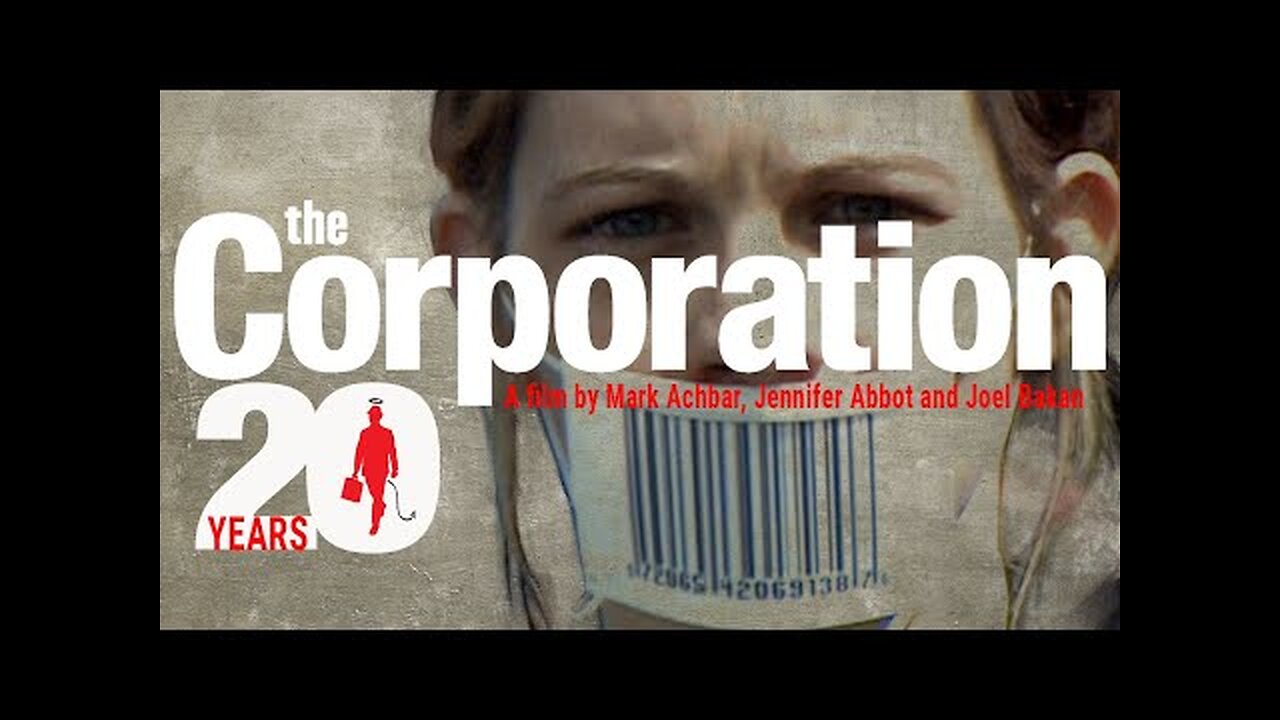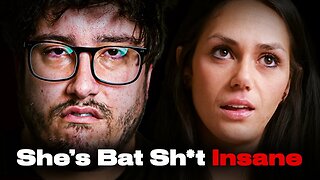Premium Only Content

THE CORPORATION
documentary in full 2003/2004
The documentary shows the development of the contemporary business corporation, from a legal entity that originated as a government-chartered institution meant to affect specific public functions, to the rise of the modern commercial institution entitled to most of the legal rights of a person. The documentary concentrates mostly upon corporations in North America, especially in the United States. One theme is its assessment of corporate personhood, as a result of an 1886 case in the Supreme Court of the United States in which a statement by Chief Justice Morrison Waite led to corporations as "persons" having the same rights as human beings, based on the Fourteenth Amendment to the United States Constitution.
Topics addressed include the Business Plot, where in 1933, General Smedley Butler exposed an alleged corporate plot against then-U.S. President Franklin D. Roosevelt; the tragedy of the commons; Dwight D. Eisenhower's warning people to beware of the rising military–industrial complex; economic externalities; suppression of an investigative news story about Bovine Growth Hormone on Fox affiliate television station WTVT in Tampa, Florida, at the behest of Monsanto; the invention of the soft drink Fanta by The Coca-Cola Company due to the trade embargo on Nazi Germany; the alleged role of IBM in the Holocaust (see IBM and the Holocaust); the Cochabamba protests of 2000 brought on by the privatization of a municipal water supply in Bolivia; and in general themes of corporate social responsibility, the notion of limited liability, the corporation as a psychopath; and the debate about corporate personhood.
Through vignettes and interviews, The Corporation examines and criticizes corporate business practices. The film's assessment is affected via the diagnostic criteria in the DSM-IV; Robert D. Hare, a University of British Columbia psychology professor and FBI consultant, compares the profile of the contemporary profitable business corporation to that of a clinically diagnosed psychopath (Hare has since objected to the manner in which his views are portrayed in the film; see below.). The Corporation attempts to compare the way corporations are systematically compelled to behave with what it claims are the DSM-IV's symptoms of psychopathy, e.g., the callous disregard for the feelings of other people, the incapacity to maintain human relationships, the reckless disregard for the safety of others, the deceitfulness (continual lying to deceive for profit), the incapacity to experience guilt, and the failure to conform to social norms and respect the law.
Interviews :
The film features interviews with prominent corporate critics such as Noam Chomsky, Charles Kernaghan, Naomi Klein, Michael Moore, Vandana Shiva, and Howard Zinn, as well as opinions from chief executive officers such as Ray Anderson (from Interface, Inc.), business guru Peter Drucker, Nobel laureate economist Milton Friedman, and think tanks advocating free markets such as the Fraser Institute. Interviews also feature Dr. Samuel Epstein, who was involved in a lawsuit against Monsanto for promoting the use of Posilac (trade name for recombinant Bovine somatotropin) to induce more milk production in dairy cattle, and Chris Barrett who, as a spokesperson for First USA, was the first corporately sponsored college student in America.
Directed by - Mark Achbar, Jennifer Abbott
Written by - Joel Bakan, Harold Crooks, Mark Achbar
Produced by - Mark Achbar, Bart Simpson ( YES BART SIMPSON! : Timber)
Narrated by - Mikela J. Mikael
Cinematography - Mark Achbar, Rolf Cutts, Jeff Hoffman, Kirk Tougas
Edited by - Jennifer Abbott
Music by - Leonard J. Paul
Production company - Big Picture Media Corporation
Distributed by - Zeitgeist Films
Release dates -September 10, 2003 (Toronto International Film Festival), January 16, 2004
Running time - 145 minutes
Country - Canada
Language - English
Box office - $4.84 million
-
 56:45
56:45
VSiNLive
1 hour ago $1.54 earnedA Numbers Game with Gill Alexander | Hour 1
17.7K -
 1:29:21
1:29:21
Graham Allen
4 hours agoGreenland WILL BE The 51st State! Trump DEMANDS IT! + Massive Fires Break Out All Over California!!
60.5K72 -
 LIVE
LIVE
LFA TV
15 hours agoBURN DEI TO THE GROUND! | LIVE FROM AMERICA with JEREMY HERRELL 1.8.25 11am
4,778 watching -
 LIVE
LIVE
Caleb Hammer
1 hour agoSomeone Finally Snapped On Financial Audit
197 watching -
 51:01
51:01
MYLUNCHBREAK CHANNEL PAGE
1 day agoThe Fire Games - Trilogy
11.4K7 -
 2:10:37
2:10:37
Matt Kohrs
12 hours agoMarket Crash Incoming?! || The MK Show
39.1K2 -
 42:28
42:28
BonginoReport
5 hours agoDon’t Trust Zuck (Ep.114) - 01/08/2025
74.5K107 -
 DVR
DVR
Chicks On The Right
6 hours agoCalifornia on fire, Trump's absolutely LIT presser, and Sunny Hostin gets some karma
25.6K6 -
 1:32:15
1:32:15
Game On!
11 hours ago $2.43 earnedTom Brady will pick the Raiders next head coach and Bill Belichick is his FAVORITE choice!
21.5K3 -
 1:12:16
1:12:16
LFA TV
15 hours agoGame-B with Guest Courtenay Turner | WORLD HD 1.8.25
51.3K